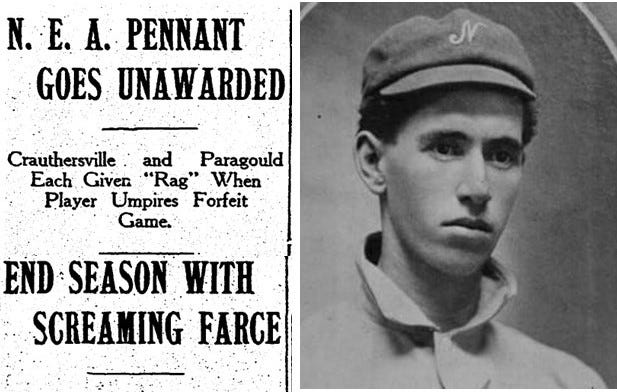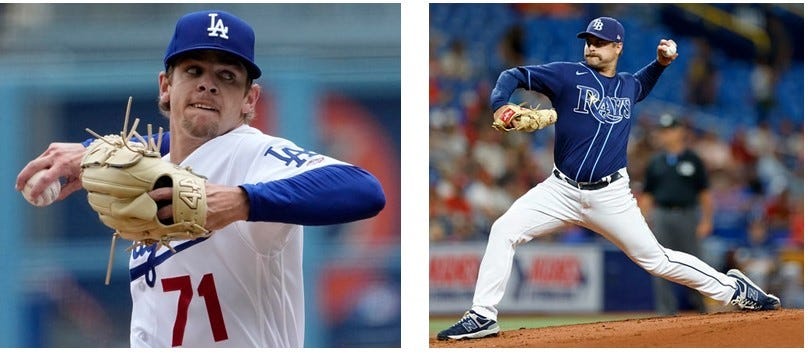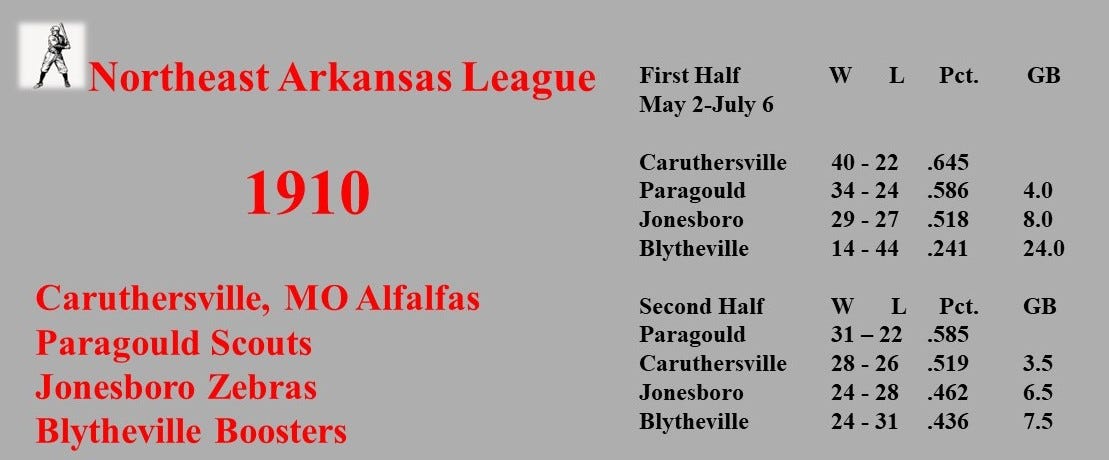Backroads and Ballplayers #57
Stories of the famous and not-so-famous men and women from the days when baseball was "Arkansas' Game." Always free and always short enough to finish in one cup of coffee.
Arkansas Guys & One More Rube Robinson Story
As of today, there are four active Arkansas-born major leaguers. Jordan Wicks (Conway) was reactivated on June 7. He was on a rehab assignment after what the Cubs called “lower arm discomfort,” until being added to the roster over the weekend. I don’t see him on the starting pitcher schedule which makes me wonder if the Cubs plan to use him in relief for a few innings before he gets a start.
Wicks joins pitchers Gavin Stone (Lake City), Jalen Beeks (Prarie Grove), and Drew Smyly (Little Rock) as the only current Arkansas-born major leaguers. Perhaps more meaningful in the “dreams come true” category, Grant Koch (Fayetteville, Razorbacks) was released last week after spending a few days in the “Show.”
Gavin Stone - Lake City, Arkansas, Riverside High School, UCA
What a difference a year makes!
This time last year Gavin Stone had been given three starts by the LA Dodgers. Those three appearances had not gone especially well. He had pitched ten innings, given up 23 hits, and allowed 16 earned runs.
The Dodgers didn’t give up. On the contrary, Stone became a “frequent flyer” from the Dodgers’ farm club in Oklahoma City to emergency starts in LA. The Dodgers publically said all the right things. “I’m not saying he’s Orel Hershiser, but he’s a bulldog. It’s a little Orel Hershiser-esque.” —Dodgers Manager Dave Roberts
Oral Hershier??? In 2023, Stone pitched 31 innings and gave up 31 earned runs. His 9.00 ERA was easy to calculate, but the Dodgers were confident, and they were correct.
Gavin Stone leads the 2024 Dodgers’ pitching staff with seven wins. He has given up two earned runs in his last 17+ innings, and his ERA is 2.93. Over those last three starts, Stone has walked four and struck out 19. He is fifth in the National League in wins and tenth in ERA. Los Angeles has won nine of his twelve starts.
Can you imagine the atmosphere at Dodger Stadium compared to Riverside High, The University of Central Arkansas, and Oklahoma City?
BUT…Dave Roberts predicted, “He is a bulldog.” We UCA grads would say, “He’s a Bear!”
Jalen Beeks - Prarie Grove High School, Razorbacks
A fresh start in Colorado…
Jalen Beeks has bounced back to find an important place in the Colorado Rockies bullpen. He leads the team in saves and batting average against (.217).
After pitching well for the Rays in 2022, Beeks ERA ballooned to almost six in 2023, and he spent most of the second half of the season in triple-A. Colorado picked him up on waivers in the fall.
It looks like a fresh start may have been just the right fix for his inconsistency in 2023. He has not given up a hit or a walk in four of his last five relief appearances.
Jalen Beeks has had a very nice big-league career as a spot starter and relief pitcher. He has appeared in 159 games, with an 18-14 record, and 11 career saves. He has earned something like four million in salary, and he will be a free agent in the fall.
Grant Koch - Fayetteville High School, Razorbacks
Grant Koch, major leaguer…
I can safely say that Grant Koch was a fan favorite during his time at Arkansas. He was certainly one of my all-time favorites. Does it seem like we have had a lot of outstanding catchers at Arkansas?
Koch was first-team All-SEC in 2017, and All-SEC Defensive Team in 2018. He was taken in the fifth round by the Pirates in 2018. Since becoming a pro, he has played six seasons and 300+ games in the Pittsburgh farm system. Koch has proven to be an outstanding defensive catcher, but his lifetime batting average is close to .200.
On May 27, Fayetteville’s Grant Koch got his call to report to the Pirates. His first big-league stay lasted about a week. He played in three games and batted seven times without a hit. Koch scored a run in his first big-league start on May 29 when he caught his former minor league batterymate Paul Skenes in a 10-2 victory over the Tigers.
The Pirates returned Koch to AAA Indianapolis, on June 8. Congratulations Grant Koch, the 23,209th player to reach the major leagues and the 228th Arkansas-born big leaguer. I hope there will be another big-league call in the future.
Lost Stories: Arkansas Baseball in the Dead Ball Era
Before I return to my town-team project, which, by the way, will probably never really end, I have a few more lost stories from the troubled decade from 1910 - 1920. Making payroll was an adventure, pitchers openly abused the baseballs to gain a grip advantage, and college guys often declined pro baseball contracts because the pay and stability were better in the workforce. Called the “Dead Ball Era,” it was not baseball’s finest hour.
By the end of the first decade of the 20th century, the Travelers had sold their franchise, most of the state’s minor leagues had ceased to exist, and college sports were the “only game in town.”
In the next two months in Only in Arkansas, I will share the stories of two of the men behind the renewed interest in college football and baseball.
One More Rube Robinson Story
Obviously, I have a lot of Rube Robinson stories. First, I need to explain why I call this guy Rube Robinson. He was born John Henry Roberson, but almost none of his baseball stories can be researched using his “real” name.
For some reason known only to BaseballReference.com, his professional career is listed under the name Hank Robinson, another name that is also seldom used in any written accounts of his career. To make it even more of an adventure to find his baseball record, there are at least two more Hank Robinsons listed at BaseballReference.com.
Realistically, BaseballReference is not going to change anything, especially his name. His stats are also incomplete, and they are also highly unlikely to change or correct those. Somehow, I think the folks at BaseballReference.com are a little busy with the here and now.
John Henry Roberson was carelessly given the name Rube Robinson somewhere in the first few years of his minor league career, and most of the accounts of his baseball life can be found in newspapers that identify him by that name. So, for simplicity, I use the name most often used by Arkansas sports writers.
After three seasons playing for various minor league teams in Arkansas, Rube Robinson began the 1910 season with Class C El Reno, Oklahoma, in the Western Association. He remained with El Reno until July 31, when the fragile franchise folded. He finished the season with Caruthersville, Missouri, in the Northeast Arkansas League, a poorly led and financially shaky hot mess of a four-team loop just hanging on by a thread. The misadventures of the NEAR are lost stories. That might be a good thing.
Technically the NEAR League was created after the Arkansas State League gave up in the middle of the 1909 season. That is another story that might take a few thousand words. The new league’s four members, Caruthersville Alfalfas, Paragould Scouts, Blytheville Boosters, and Jonesboro Zebras were united by good intentions and desperation, but doomed by lack of leadership. Forfeits were common, disputes were almost an everyday event, and players jumped teams like there was a transfer portal. When things got especially difficult, the president of the league went on vacation.
Despite the sad state of affairs in the bungling Class D loop, the inept little four-team bush league was Robinson’s only choice for a baseball payday for the second half of the summer of 1910.
In the league Rube Robinson joined, affairs were handled by letter, and forfeits, double forfeits, and games played under protest, created a statistical nightmare. Players often joined the visitors when they left town, and malaria arrived in the Delta with mosquitos and sweltering summer heat. Players must have wanted to play or needed a job. Amazingly, the league finished the season, but we are still waiting for the champion to be declared.
The regular season ended on September 6, and some brave statistician declared that Caruthersville was the winner of the first half of the season, and Paragould was the second-half champion. That decision alone was some sort of amazing accounting since no two teams had played the same number of games.
A best-of-five championship series would begin in Caruthersville, followed by two games in Paragould if necessary. A fifth game would be played in Blytheville if each team had two wins. The league leadership was pleased, and fans were excited, but the league had neglected the small detail to include the post-season in the umpire’s contracts. When the regular season ended, the umps went home.
Undeterred, the league announced that each team would supply an umpire from unneeded players. The starting pitcher from the previous game was the popular choice. Of course, given the way things had gone for the NEAR in 1910, the post-season umpiring plan was doomed from the beginning.

Paragould won the first game, 3-1, and the fourth game, 2-1, while Caruthersville won games two and three, 4-1 and 5-4. For the championship game, league president Joe Bertig announced that he had found a local catcher to umpire the game. However, the teams said “No thanks, the system of having two players as umpires has worked fine so far.”
The management of the two teams agreed that “Rube” Robinson of Caruthersville and Donald Dickey of Paragould, would umpire the game. Rube was well thought of among his fellow players. He was honest, fair, and unflappable. Apparently, so was Donald Dickey. Everything was fine. Fans filled the stands, and all the problems the league had encountered to get to this point were forgotten. Then the game started.
In the first inning, Robinson made a safe call on a close play that resulted in three Alfalfa runs. A pro-Paragould sports writer lamented that Caruthersville scored all their runs after “three were out.”
Other controversial calls by both umps soon turned the game into an “our ump,” and “their ump” affair, with a genuine baseball rhubarb almost every inning. The partisan unrest reached a climax in the sixth inning when Robinson made a strikeout call on a marginal pitch. The Paragould batter threw his bat at Robinson in disgust. Although the bat missed, the “slap” to the jaw did not. Police were summoned to the field for the rest of the game.
Before the inning ended, Robinson needed police protection on two more occasions. The usually even-tempered Robinson had enough. He stepped out to home plate and announced that the game was being forfeited to Caruthersville. The score would be recorded as 9—0.
Not to be outdone, Dickey subsequently announced that the game would indeed be forfeited, but the Alfalfas would be the forfeiting team and Paragould would be declared the 9—0 winner.
In a decision consistent with the lack of leadership in the NEAR, the league president declined to act. The players went home, and the tumultuous 1910 Northeast Arkansas League season was over without a champion. Rube Robinson would go on to be the winningest Arkansas-born professional pitcher in history, but he never pursued a career as an umpire.
The hapless little loop called the North Arkansas League attempted one more season. The regular season began on Sunday, April 30, 1911, and the last official NEAR game was played on Wednesday, July 5, 1911.
More on Rube Robinson in Only in Arkansas.
Book ordering information: Link
Have you missed some posts? Link - https://jyeager.substack.com/
Yes, Arkansas Tech announced their 2024 Sports Hall of Fame inductees on Friday. Link
I appreciate all the kind words. If you have ever coached, you know that a coach is only as good as his players.







"End Season With Screaming Farce" is an excellent headline and I plan to use it when one of my teams loses in the postseason. Congrats on the Hall of Fame!